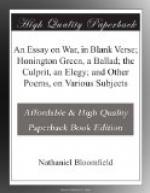15
While the Green, tho’ but Daisies
it’s boast,
Was free as the Flow’rs to the Bee;
In all seasons the Green we lov’d most,
Because on the Green we were free;
’Twas the prospect that first met my eyes,
And Memory still blesses the scene;
For early my heart learnt to prize
The Freedom of Honington Green.
16
No Peasant had pin’d at his
lot,
Tho’ new fences the lone Heath enclose:
For, alas! the blest days are forgot,
When poor Men had their Sheep and their Cows.
Still had Labour been blest with Content,
Still Competence happy had been,
Nor Indigence utter’d a plaint,
Had Avarice spar’d but the Green.
17
Not Avarice itself could be mov’d
By desire of a morsel so small:
It could not be lucre he lov’d;
But to rob the poor folk of their all.
He in wantonness ope’d his wide jaws,
As a Shark may disport with the Fry;
Or a Lion, when licking his paws,
May wantonly snap at a Fly.
18
Could there live such an envious
Man,
Who endur’d not the halcyon scene?
When the infantine Peasantry ran,
And roll’d on the daisy-deck’d Green:
Ah! sure ’twas fell Envy’s despite,
Lest Indigence tasted of Bliss,
That sternly decreed they’ve no right
To innocent pleasure like this.
19
Tho’ the Youth of to-day must
deplore—
The rough mounds that now sadden the scene,
The vain stretch of Misanthropy’s Power,
The Enclosure of Honington Green.
Yet when not a green turf is left free,
When not one odd nook is left wild,
Will the Children of Honington be
Less blest than when I was a Child?
20
No! ... Childhood shall find
the scene fair,
Then here let me cease my complaint;
Still shall Health be inhal’d with the Air,
Which at Honington cannot be taint:
And tho’ Age may still talk of the Green,
Of the Heath, and free Commons of yore,
Youth shall joy in the new-fangled scene,
And boast of that change we deplore.
21
Dear to me was the wild-thorny Hill,
And dear the brown Heath’s sober scene;
And Youth shall find Happiness still,
Tho’ he roves not on Common or Green:
Tho’ the pressure of Wealth’s lordly
hand
Shall give Emulation no scope,
And tho’ all the’ appropriate Land
Shall leave Indigence nothing to hope.
22
So happily flexile Man’s make.
So pliantly docile his mind,
Surrounding impressions we take,
And bliss in each circumstance find.
The Youths of a more polish’d Age
Shall not wish these rude Commons to see;
To the Bird that’s inur’d to the Cage,
It would not be Bills to be free.
* * * * *
THE CULPRIT.
“Man hard of heart to Man! ... of horrid things Most horrid; midst stupendous highly strange: Yet oft his courtesies are smoother wrongs; Pride brandishes the favours he confers, And contumelious his Humanity. What then his vengeance? hear it not, ye Stars, And thou, pale Moon, turn paler at the sound: ... Man is to Man the sorest, surest Ill.”
YOUNG.




